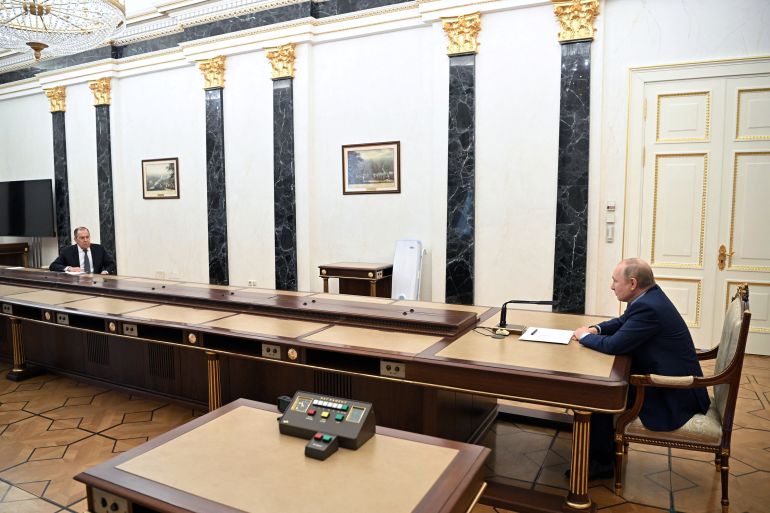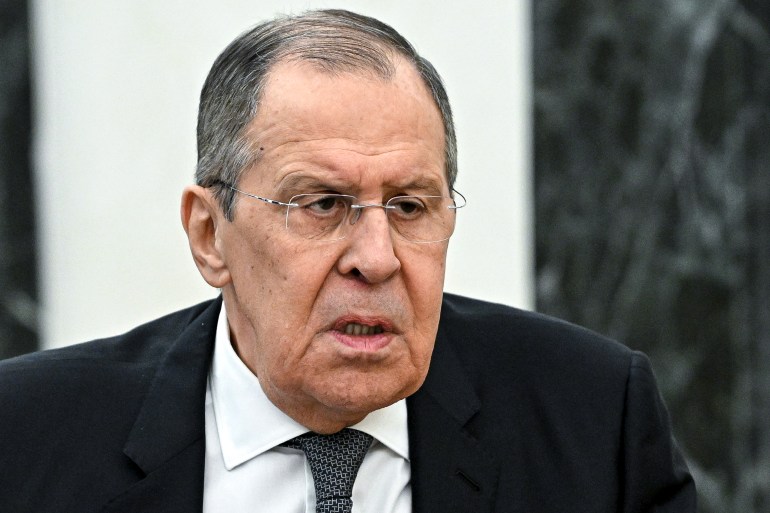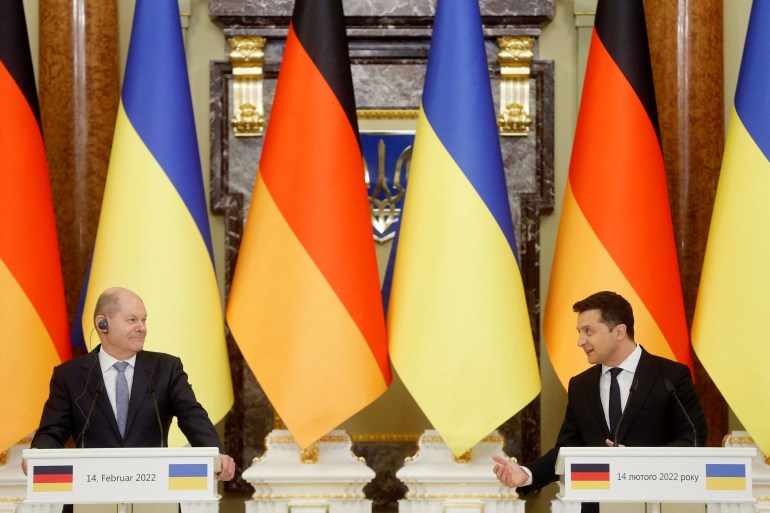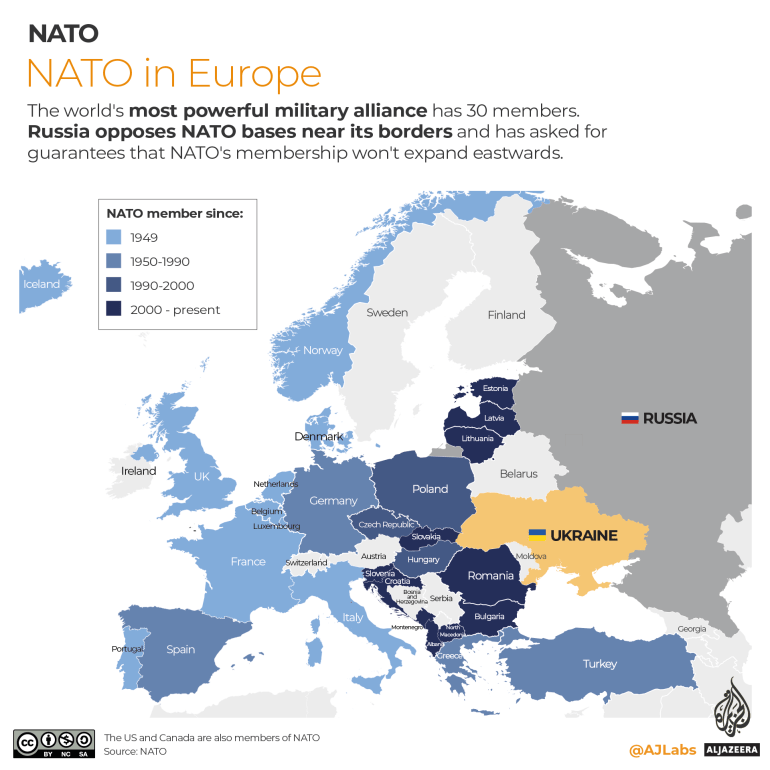Russia says ready to continue diplomacy amid Ukraine crisis
Russian Foreign Minister Sergey Lavrov urges President Vladimir Putin to continue talks on resolving the standoff with Western powers over Ukraine.

Russia has said it will continue diplomatic talks with the West to try to defuse a security crisis in which it has massed a huge force within striking distance of Ukraine.
In a televised exchange between Russian President Vladimir Putin and Foreign Minister Sergey Lavrov on Monday, the latter said “there is always a chance” to reach an agreement with the West over Ukraine.
Keep reading
list of 3 itemsBiden promises ‘swift’ response if Russia invades Ukraine
Timeline: How the Ukraine-Russia crisis reached the brink of war
He told Putin that exchanges with leaders in European capitals and Washington showed enough of an opening for progress on Russia’s goals to be worth pursuing.
“I would suggest continuing,” Lavrov said in televised remarks. “Fine,” Putin replied.

Lavrov told Putin the United States had put forward concrete proposals on reducing military risks, but that responses from NATO and the European Union – which has been at pains not to let Moscow divide its members – had not been satisfactory.
“It remains to be seen whether these are real negotiations or designed to merely delay the invasion that (Putin) has said he might undertake while he continues to slice away at the West’s position,” the International Republican Institute’s Stephen Nix told Al Jazeera from Washington, DC.
On Monday, the US announced it would temporarily relocate its embassy in Kyiv to the western Ukrainian city of Lviv near the Polish border due to what it called the “dramatic acceleration in the buildup of Russian forces”.
In a statement announcing the move, Secretary of State Antony Blinken said the US would continue to push for a diplomatic solution.
“The path for diplomacy remains available if Russia chooses to engage in good faith. We look forward to returning our staff to the Embassy as soon as conditions permit,” Blinken added.
President Joe Biden, who had spoken to Putin over the weekend, held a phone call with British Prime Minister Boris Johnson on Monday.
“The leaders discussed their recent diplomatic engagements with Ukraine and Russia,” the White House said in a statement describing the call.
“They also reviewed ongoing diplomatic and deterrence efforts in response to Russia’s continued military build-up on Ukraine’s borders and reaffirmed their support for Ukraine’s sovereignty and territorial integrity.”
For its part, the British government said Biden and Johnson “agreed there remained a crucial window for diplomacy and for Russia to step back from its threats towards Ukraine.”
Russia has positioned more than 100,000 troops near Ukraine’s borders but denies planning to invade, accusing the West, which has sent a flurry of officials to Moscow and Kyiv, of hysteria.
Scholz urges dialogue
German Chancellor Olaf Scholz visited Kyiv on Monday, vowing that Berlin and its Western allies would maintain support for Ukraine’s security and independence, urging Russia to take up “offers of dialogue”.
During a news conference with Ukrainian President Volodymyr Zelenskyy, Scholz said there was “no reasonable justification” for Russia’s build-up of troops around Ukraine’s borders.
Al Jazeera’s Natacha Butler, reporting from Kyiv, says Scholz delivered a “show of unity” with his host during his visit to the Ukrainian capital.

“Both [Scholz and Zelenskyy] spoke about the importance of supporting Ukraine’s territorial integrity and the German chancellor also said he would be bringing a warning to Russia when he visits Moscow on Tuesday and meets Putin,” she said.
Meanwhile, United Nations Secretary-General Antonio Guterres believes “from his own analysis, his own hopes” that there would not be a conflict, a UN spokesman said on Monday.
Guterres expressed “serious concern” during his phone calls with Russia’s Lavrov and Ukraine’s Foreign Minister Dmytro Kuleba on Monday over the heightened tensions, UN spokesman Stephane Dujarric said.
“He welcomed the ongoing diplomatic discussions to defuse those tensions and underlined, yet again, the fact that there is no alternative to diplomacy,” Dujarric added.
NATO membership
Ukraine’s ambassador to the UK on Monday backtracked on remarks suggesting that Kyiv would reconsider its attempt to join NATO – one of Russia’s primary concerns – but did say that other concessions could be on offer.
“We are not a member of NATO right now and to avoid war we are ready for many concessions, and that is what we are doing in conversations with the Russians,” Ambassador Vadym Prystaiko told the BBC in a clarification.
“It has nothing to do with NATO, which (membership application) is enshrined in the constitution.”

The Kremlin said that Ukraine renouncing its aspirations to join the Western military alliance would significantly help address Russia’s concerns.
Moscow has made clear it sees the former Soviet republic’s quest for closer ties with the West, notably through NATO, as a direct threat.
Eight years ago, mass protests on Kyiv’s Maidan square in favour of closer integration with the West forced out pro-Russian former President Viktor Yanukovych.
Faced with the ascendancy of pro-Western politicians promising to advance democracy and fight corruption just across its border, Russia in 2014 annexed Ukraine’s Crimean Peninsula, home to the Russian Black Sea fleet.
It also supported pro-Russian rebels who have seized part of Ukraine’s industrial, largely Russian-speaking east in a war in which more than 14,000 people have already been killed.